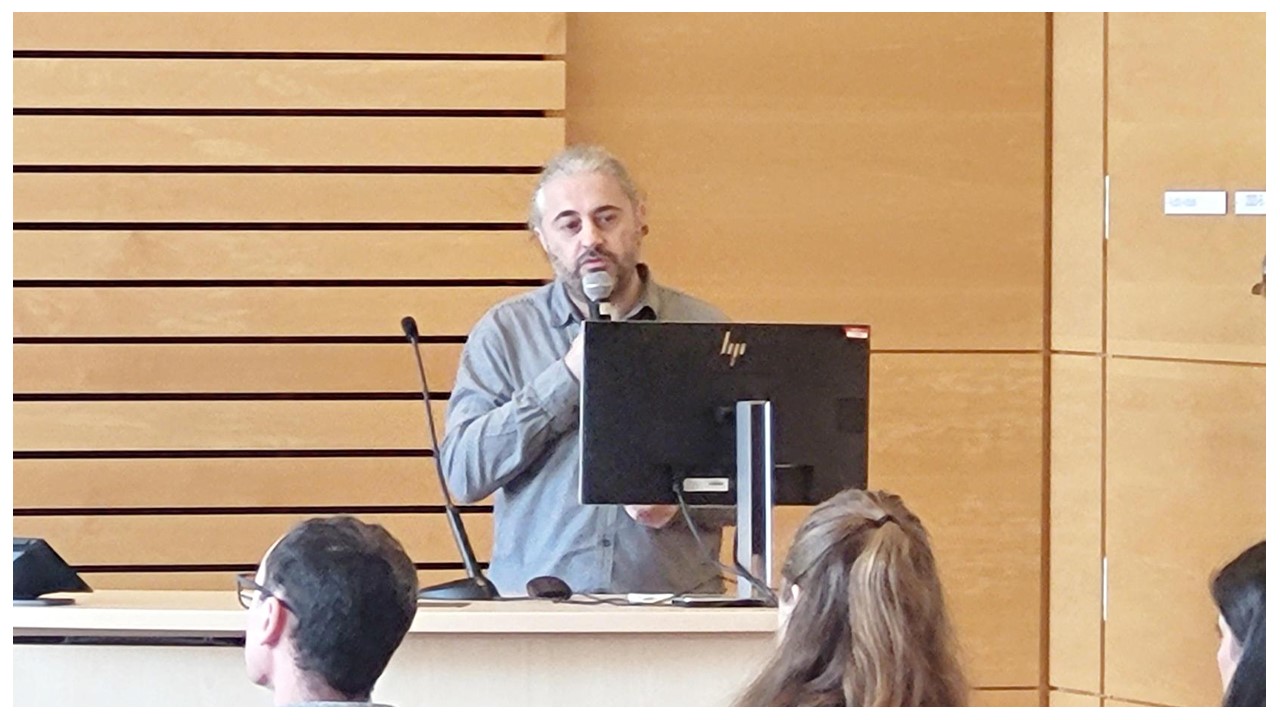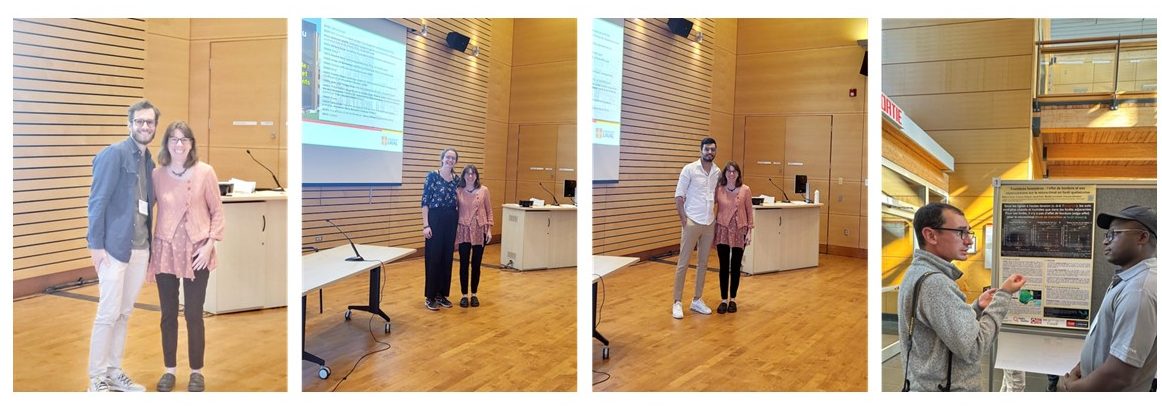Great success for the CRMR annual symposium!
Under the theme « Towards a Sustainable Transition: Renewable Materials and the Fight Against Climate Change! », the annual symposium of the Renewable Materials Research Centre ( CRMR) was a great success! The event was held on 23 October 2024 at Laval University in Quebec City and brought together more than 95 participants.
The conference provided a multidisciplinary forum for sharing and exchanging knowledge on the challenges and opportunities of the ecological transition. It brought together various stakeholders, including members of the CRMR and speakers with a range of expertise related to the theme of the event. It also highlighted the transition from degree to job by inviting former graduates to share their experiences and career successes. These testimonials helped to establish an enriching link between current students and alumni, illustrating the career opportunities offered by training in renewable materials.
The event also played a key role in promoting research and development, while strengthening interdisciplinary collaboration. Partnerships were established or consolidated with renowned institutions such as Serex, SOKIO Industrie, the Trottier Energy Institute at Polytechnique Montréal, and UQAM. This underlines the importance of joining forces to tackle today’s environmental challenges.
Alexis Achim, Vice-Dean for Research at the Faculty of Forestry, Geography and Geomatics (FFGG), opened the symposium by expressing his gratitude to all the participants, speakers and panellists for their involvement. He stressed the importance of bringing together members of the CRMR and experts from various sectors to discuss the ecological transition. The programme of the event included a poster session for student projects, lectures, and a round table discussion covering a wide range of topics, with the participation of experts from multiple disciplines.

Opening of the symposium by Alexis Achim
The conference began with a presentation from Bertrand Laratte, a new regular researcher at the CRMR and associate professor of environmental engineering in the Department of Wood and Forest Sciences at the Faculty of Forestry, Geography and Geomatics (FFGG), Laval University. His presentation, entitled « L’Analyse du Cycle de Vie (ACV) pour les produits biosourcés : Perspectives », provided an in-depth overview of the benefits and challenges associated with biobased materials throughout their lifecycle. This approach aims to maximise the environmental impacts of biobased materials while meeting performance objectives.

Conference by Bertrand Laratte
The second presentation, entitled « La greentech bioinspirée d’Amazonie française », was given by Mariana Royer, founder and president of Bio Stratège Guyane (BSG). BSG is the first private eco-extraction, quality control and green formulation laboratory dedicated to developing Guyana’s bioresources. Mariana explained how the rich biodiversity of the French Amazon inspires sustainable solutions, promoting both environmental protection and the economic development of local communities. Her laboratory strives to promote extraction methods that respect the ecosystem, while guaranteeing high quality products through rigorous controls. By highlighting concrete examples of projects carried out by BSG, she demonstrated how greentech can be a powerful lever for enhancing the value of natural resources, while responding to contemporary environmental issues. The presentation attracted a great deal of interest from the audience. Mariana’s journey as an entrepreneur is particularly inspiring: she has navigated a complex and dynamic environment to found a company that combines a passion for biodiversity with a commitment to sustainable development. Many thanks to Alexis Achim for hosting the first two conferences.
Three presentations during the event highlighted the innovative research being carried out by our post-doctoral researchers. The first presentation, given by Maxime Parot, explored the following theme:« Utiliser du bois pour éteindre le feu : fabrication d’un gel à base de filament de cellulose pour la lutte contre les incendies ». Maxime highlighted the many applications of cellulose filament as a sustainable material, contributing to more environmentally-friendly practices. The second presentation, entitled « Libérer le potentiel de la biomasse marocaine : production de nanocellulose et ses diverses applications », was given by Anass Ait Benhamou. He analysed Morocco’s biomass resources and their transformation into nanocellulose, a material with multiple advantages. Anass also highlighted the various applications for nanocellulose, ranging from sustainable packaging to advanced composites. Finally, the third lecture, given by João Vítor Felippe Silva, dealt with « Évaluation de la qualité de collage des bois feuillus » in the context of their use in the manufacture of solid wood composites. João highlighted the challenges and innovations in this area, providing valuable insight into bonding techniques and their impact on composite performance. Many thanks to Liza Abid and Evelyne Thiffault for hosting the event.

From left to right: Maxime Parot, João Vítor Felippe Silva, and Anass Ait Benhamou
Our students have once again demonstrated their skills in transferring research results aimed at reducing the carbon footprint and promoting a sustainable future. In clear, accessible language, they have succeeded in presenting their work in a way that a diversified audience understands, going beyond the traditional academic framework. This ability to popularise complex concepts demonstrates not only their expertise in their respective fields, but also their commitment to effectively communicating innovative and sustainable solutions. This contributes significantly to a better appreciation of scientific advances and to raising public awareness of crucial environmental issues.
The poster session was a particularly animated affair, with the presentation of 22 posters that encouraged stimulating exchanges between the presenters and the participants. Discussions focused on the challenges and opportunities of the ecological transition, highlighting scientific innovation, renewable materials and sustainable practices. The presentations were evaluated by a panel of judges made up of professors, research professionals and postdoctoral fellows. We would like to warmly thank our judges for their support during this event.
Thanks to the support of the CRMR, four prizes were awarded to student members in recognition of the excellence of their scientific posters!

Poster session by CRMR students
After lunch, the event was enriched by a captivating presentation from Charles Séguin, professor at UQAM and an expert in economics, on the theme of « Marché du carbone : expérience québécoise et perspectives ». Mr Séguin explained how the carbon market works in Quebec, highlighting its economic and environmental impact on local industries. He also explored avenues for improvement and opportunities on an international scale, providing valuable insight into the future of climate policies based on the carbon market mechanism. The presentation attracted a great deal of interest among the participants, underlining the crucial importance of the commitment of all players in the transition to a greener economy.

Conference by Charles Séguin
The event concluded with a rewarding round-table discussion on the challenges and opportunities associated with the ecological transition in various sectors. Moderated by Alexandre Morin-Bernard and Evelyne Thiffault, professors in the Department of Wood and Forest Sciences in the Faculty of Forestry, Geography and Geomatics (FFGG), the discussion highlighted scientific and technological advances, innovative materials and sustainable practices as key elements in this transition.
The panelists, all former CRMR graduates, included Étienne Julien, director of product development at SOKIO Industrie; Mariana Hassegawa, independent researcher; Roberta Dagher, research associate at the Trottier Energy Institute at Polytechnique Montréal; and Franz Segovia Abanto, wood science researcher at SEREX. Together, they shared their perspectives and experiences, offering inspiring reflections on current issues and solutions for a sustainable future. During the round table, the speakers also addressed the transition between graduation and the world of work, sharing their personal experiences and the challenges they encountered in making the transition from academia to the professional sector. This discussion highlighted the obstacles that new graduates often face, as well as the strategies they can adopt to make this transition a success.
The round table brought the day to a close with stimulating discussions and reflections on the future of careers in an ever-changing world, where the ecological transition occupies a central place.

From left to right: Franz Segovia Abanto, Roberta Dagher, Mariana Hassegawa, and Étienne Julien
Nancy Gélinas, Dean of the Faculty of Forestry, Geography and Geomatics at Laval University, brought the conference to a fitting end by announcing the winners of the poster prizes.
Congratulations to the winners of the poster session student prizes:
- Ilias El Ouahabi: best scientific poster ($350)
- Antoine Harel and Monica Gagnier: second best scientific poster ($200)
- Luc Lionel Girompaire: ‘Coup de cœur’ prize ($50)
Nancy also emphasised the importance of the research carried out at the CRMR on renewable materials, which are essential in the fight against climate change and the transition to a sustainable economy. Her words underlined the urgency of continuing these efforts to build a more environmentally friendly future, encouraging everyone to make an active commitment to this goal.

From left to right: Luc Lionel Girompaire, Monica Gagnier, and Ilias El Ouahabi (accompanied by Nancy Gélinas), as well as Antoine Harel (on the left) explaining his poster
The organising committee of the CRMR 2024 annual conference
A huge thank you also goes to the conference committee, made up of Véronic Landry, Besma Bouslimi, Amirouche Sadaoui, Monica Gagnier, Dimitri Tomeck Andre Lor, Ilias El Ouahabi, Imenne Drif, Jeremy Michael Piggot Navarrete, Liza Abid, Ndeye Khady Ndiaye, Thomas Legendre, Tiam Mahmoudian, Vahideh Akbari, Gustavo Enrique Rodriguez Rivero, Sylvie Langevin, Alexandre Morin-Bern, Evelyne Thiffault and Rémi Georges. We would also like to express our gratitude to Anass Ait Benhamou and Ingrid Calvez for their work in developing the questions for the round table. Their dedication and hard work were essential to the success of this event.

Symposium committee
Acknowledgements
The organising committee would like to express its deep gratitude to all the participants and speakers for their exceptional commitment and the inspiring sharing of their research and development results during this event. The diversity of perspectives, innovative ideas and shared experiences made this conference an enriching and valuable experience for the entire community present. We hope that this event was just as beneficial for you, and that it will open the way to promising future collaborations.
Our sincere thanks also go to the logistical and technical support team, made up of Joseph-Antoine Coté, Antoine Harel, Tiam Mahmoudian and Kaven Després, for their invaluable contribution to the success of this event.

Photo credit: Besma Bouslimi

